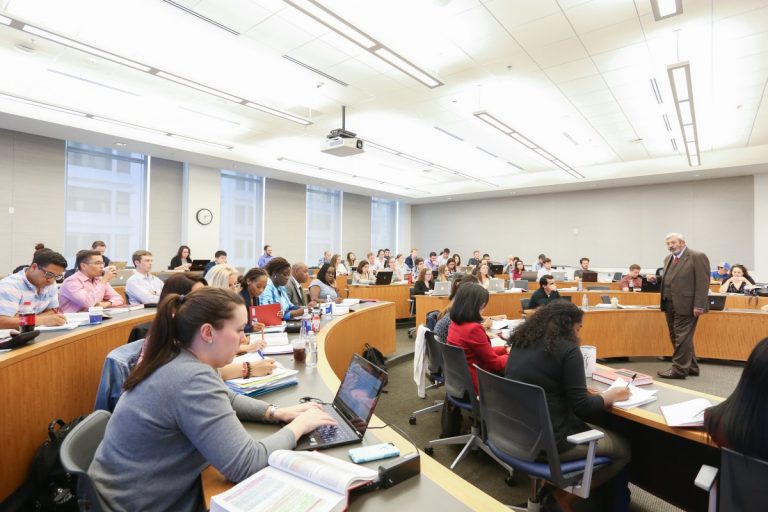
Law has long been regarded one of the most difficult subjects to study at university—and for good reason. Not only does becoming a lawyer take around eight years, it also requires students to pass two of the most difficult exams in standardized testing: the LSAT and the bar exam.
Law school is not for the faint of heart (or mind). It will test the endurance of even the most determined student. That’s why the schools that produce the law graduates who go on to change the world must foster students’ personal and professional growth throughout their academic careers. To do that effectively, law schools must provide three things: quality classroom education, hands-on work experience, and public service opportunities. These form the basis for the educational philosophy known as “experiential education.”

Experiential education blends practice with theory, and encourages students to apply what they’ve learned in the classroom to real problems through hands-on work experience. Because experiential education provides students with unique challenges they’d never encounter in a classroom setting, this philosophy works particularly well when applied to law.
This approach to learning is useful because it helps students develop a strong professional identity. Law students need to know what kind of lawyer or legal professional they want to be—not just in terms of the field they want to specialize in, but how they can use their unique skills and expertise to serve their communities effectively.
Experiential opportunities allow students to reflect on what it means to be a legal professional, engaging them on a deeper, emotional level. Perhaps most importantly, experiential education also ensures students are practice-ready by the time they graduate.
COLLEGE OF LAW, GEORGIA STATE UNIVERSITY

This school is particularly adept in providing quality experiential education, and has been ranked No.1 Best Value Law School in the United States by the National Jurist. Most courses are practice-based, and the school also offers clinics that allow students to work with people who require legal representation. Externships are another key component of Georgia State Law’s approach to education. These allow students to earn university credit while working at government agencies, courts, and nonprofit organizations throughout Atlanta, many of which are located within walking distance of the college.
The faculty at Georgia State Law take their commitment to experiential education a step further by focusing on students’ personal development from orientation to graduation. First-year Georgia State Law students participate in a nine-week professional development course that helps them begin building a strong professional identity and teaches important skills like networking, communicating, and interviewing clients. Georgia State Law’s Center for Professional Development and Career Strategies also provides students and alumni with invaluable services, including career counselling and workshops, CV and cover letter reviews, assistance with job placements, and much more.
One of the things that makes Georgia State Law a world-class school is its eagerness to meet students’ needs. In response to a growing demand for a health law program, Georgia State established its LL.M. with a concentration in Health Law earlier this year. This is the newest addition to the LL.M. programs offered at Georgia State, which prepare both domestic for advancement in a particular area of law and international students to take the Georgia bar exam.
Want to know more about the unique educational experience at Georgia State Law? Read about the school’s commitment to experiential education, or get in touch today at lawadmissions@gsu.edu.
SCHOOL OF LAW, WASHINGTON UNIVERSITY IN ST LOUIS

Washington University’s School of Law (WashULaw) is truly a global institution. WashU Law graduates work in every corner of the world, including the court system of Somalia, mediation firms in Italy, and women’s rights groups in Ghana. The school teaches not just domestic law, but also international law to ensure students are prepared to practice around the globe.
WashULaw helps students take their first baby steps into the world by encouraging them to work outside of St. Louis through a semester-in-practice externship. This allows second- and third-year students to work full-time at a firm or legal organization anywhere in the US. Another unique feature of the WashU Law experience is the school’s Public Services Advisory Board, led for students, by students. The PSAB provides public service opportunities in which students’ efforts will positively impact their communities.
To find out more about the WashU Law experience, get in touch via email today at applylaw@wustl.edu.
BEASLEY SCHOOL OF LAW, TEMPLE UNIVERSITY

Temple University believes that experiential learning should begin on the very first day of law school. Even the introductory and foundation courses offered in the first year of the program are practice-based, and allow students to hone their skills by working on mock cases in a simulated courtroom setting.
But the learning doesn’t stop when the semester is over; first-year students can participate in one of two summer programs that give them the chance to live and work in Washington D.C. or Philadelphia. Integrated programs also allow students to enhance their interviewing and negotiating skills.
In addition to clinics and externships, students can participate in the Temple Law practicum, which allows them to work up to 12 hours per week in a legal setting of their choice. Temple Law practicum students have worked with prestigious institutions such as the US Department of Education and the ACLU.
SCHOOL OF LAW, UNIVERSITY OF CONNECTICUT (UConn)

UConn’s School of Law implemented experiential education techniques as early as 1929, when its law students were first allowed to assist legal professionals in a small claims court setting. In fact, UConn Law may be considered a founder of the experiential law education movement—it was one of the first schools to ever offer an in-house clinic which provides legal services to people who cannot afford them.
Today, UConn Law’s experiential opportunities have only expanded. Students can participate in clinic placements and simulation courses, as well as individual and international field placements which ensure students earn work experience in their chosen field. UConn Law students have worked with major companies and institutions, such as the Robert F. Kennedy Center for Human Rights, the Connecticut Department of Energy and Environmental Protection, and Connecticut’s Superior Court system.
Click here to find out what makes UConn a national leader in experiential education.
JAMES E. ROGERS COLLEGE OF LAW, UNIVERSITY OF ARIZONA

“There’s nothing that demonstrates the power of legal education than to help a real client resolve a life crisis.” – Matt Randle, University of Arizona Law alumnus, class of 2014.
Studying law at the University of Arizona allows students to do just that, whether it’s through clinics, externships, clerkships, workshops, or placements. In addition to existing externship opportunities, students may also propose their own externship if they can’t find anything that suits.
One of the most popular public service opportunities at UA Law is representing US veterans in Veterans Court in Tuscon. Because there is currently a high volume of claims cases, lawyers are desperately needed to represent disabled veterans as well as those charged with crimes that are often related to PTSD and other mental health issues associated with veterans’ time in service. This not only gives students valuable work experience, but also allows them to give back to those who gave all.
The world-class law schools we’ve mentioned here do so much more than just teach legal jargon. Most importantly, they provide students with opportunities to dive headfirst into the working world, where they can practice using the skills they’ll need after graduation.
*Some of the institutions featured in this article are commercial partners of Study International
Liked this? Then you’ll love these…
Experience the legal craft with UConn School of Law
3 reasons to study at Temple University’s Beasley School of Law







